• View all sections of this story with photos and a chart.
Odds are, you've never shopped at CC Restaurant Supply.
Though it's in a Palo Alto "neighborhood commercial" zone, which is designed for restaurants, small offices and retail establishments that service the immediate neighborhood, it's not exactly a magnet for residents living in the Ventura area.
Despite its location along El Camino Real, one of Palo Alto's busiest commercial arteries, it is largely obscure from the outside world. A vehicle cruising north on El Camino sees only darkness inside, punctuated by partially open blinds. A pedestrian peering in through the blinds can see only a tiny fraction of the store's inventory — a meat slicer here, a coffee grinder there, a wicker basket of silverware.
You can, of course, get a better sense of what CC offers if you go in when the store is open. That's when you see a small room with shelves stocked with flavoring syrups, coffee filters, boxes of Ziplock bags, a display can of Diet Coke next to a display bottle of Orangina, and then an open door leading to a much larger room filled with crates, metal shelves, pots, pans, boxes and bulk supplies.
But buyer beware: The opportunity to shop here doesn't knock all that often. Its hours are from 8 to 9:30 a.m. on Tuesdays and Wednesdays and from 8:30 to 10 a.m. on Thursdays.
The business may not be widely known to the general public, but Palo Alto's code-enforcement officers have been regular visitors. They began to investigate CC Restaurant Supply for a possible zoning-code violation in the fall of 2015, after a resident filed a complaint and submitted photos showing a van with a Coupa Cafe logo regularly leaving the site in the morning hours. The van's comings and goings, coupled with the fact that CC Restaurant Supply and Coupa have the same owner, fostered the impression that the building was being used as an illegal warehouse for the cafe business. In October of that year, code enforcement notified the building owner of the complaint and informed him that warehouses are illegal in a neighborhood commercial (known as CN) zone.
The following January, after some back and forth with the building owner, Chief Planning Official Amy French and James Stephens, the city's lead code-enforcement officer, visited and found some irregularities, which French detailed in a letter to Winter Dellenbach, the resident who filed the complaint. French said she and Stephens had "witnessed the blocked storefront windows, (a) makeshift sign with a bogus phone number for 'sales by appointment' and (a) padlocked, fenced parking lot at rear."
French noted in an email, which the Weekly obtained through a Public Records Act request, that she called the number and "was dismayed that there was no recognition of any restaurant supply business." Given that earlier in the month, CC's owner, Jean Paul Coupal, had applied for and received a new "use and occupancy permit" that listed the business as an "extensive retail" operation, this struck the city as unusual. (The permit approval process involves both the fire department and building division, who check for safety and to "ensure that zoning regulations are being followed," according to the city.)
"We agree the operations there do not live up to the 'extensive retail' land use the business claimed on the Use and Occupancy Permit that was issued at the Development Center on Jan. 29," French wrote. "An 'extensive retail' store would need to have hours of operation open to the general public."
In the months after that visit, code enforcers continued to pop in for inspections. They determined that CC was conducting retail during its very limited hours of operations, and they compelled the business to change its window displays to allow more visibility.
But to the public at large, little changed. The Coupa vans continued to come on a regular basis. In April 2016, City Councilwoman Karen Holman reached out to city staff to inquire about what was happening at 3457 El Camino Real.
"This is a very long time to have a non-compliant use (and windows) in a street-facing CN-zoned El Camino location," Holman wrote. "Coupa is a desirable and popular cafe in the community, but that should not exempt them from being a good neighbor in non-cafe locales."
Dellenbach sees this property and others like it (she has an extensive list) as indicative of a troubling Palo Alto trend: the death of neighborhood-serving businesses. Buildings in south Palo Alto that were once occupied by veterinarians and dry cleaners have been taken over by headquarters for local tech companies, multi-national corporations and support operations for other businesses. As a result, once-walkable neighborhoods are no longer so, she said.
"We treasure our retail stores — not just retail but things like medical services and physical therapy — that really offer actual valuable services to locals in the neighborhood," Dellenbach said.
So when she saw the blinds shutter on the CC building — formerly occupied by Quality Discount Tile — and a paper "sales by appointment" sign go up on a door, she decided to take action.
"It offended me because it was certainly not in the spirit of the law and not in the letter of the law," Dellenbach said.
Another example of high-tech businesses taking over neighborhood-retail sites occurred earlier this year, according to Dellenbach. A tech company called InnoSpring, which provides services to startups, received a permit to move into the 3400 block of El Camino, where previously there was a medical office.
Both Holman and Dellenbach see these kinds of situations as symptoms of a broader regulatory problem in Palo Alto: The city's code enforcement is chronically lax. City officials, despite initial misgivings, didn't institute any penalties against CC Restaurant Supply before closing the case last summer. All they did was require that the store modify the display area and hold regular hours of operation. Because the municipal code does not specify what those hours should be, five hours per week sufficed.
From the perspective of code-enforcement, the resolution of this case was a success story. The city worked with Coupal to address residents' immediate concerns and, after the requested modifications were made, determined that the store complied with city code.
"You can walk in there, and I've actually seen people from other businesses in there, getting some cups or other things," Stephens said. "It's not as convenient as Costco — the hours aren't nearly as user-friendly — but it's a matter of 'spirit of the law' versus 'letter of the law.' Until we get some other issue where it can be enforced, they are legally operating within the confines of the municipal code."
Dellenbach, who has called CC Restaurant Supply a "charade" and a "farce" and who referred to its retails hours as "lipstick on a pig," saw things differently.
"To say that this retail site is anything but an illegal warehouse is to insult the people in the two neighborhoods," Dellenbach said in referring to Ventura and Barron Park.
Not making the grade
For a team that consists of just three people, Palo Alto's code enforcers have been facing an unprecedented level of public scrutiny of late. In January, the council received the latest National Citizens Survey that showed a troubling trend: only 52 percent of the respondents rated Palo Alto code enforcement as "good" or "excellent" in 2016, down from 59 percent in 2015 and 62 percent in 2014.
The results have prompted some head-scratching among city officials. City Auditor Harriet Richardson, who coordinates the national survey under a contract with the National Research Center, noted in the report that many respondents who rated the quality of code enforcement as "fair" or "poor" had not actually observed any code violations.
There's also some confusion about what exactly people are upset about. Is it construction noise and overgrown weeds? Is it hacker houses and Airbnb rentals in residential neighborhoods? Is it unenforced (and thus non-existent) "public benefits" from approved development projects and businesses that don't conform with zoning laws?
The term "code enforcement" seems to be at least somewhat correlated to residents' broader frustrations about development and its impact. It is perhaps no coincidence that only 37 percent of the residents in the National Citizens Survey gave "good" or "excellent" ratings to the city on "land use, planning and zoning" in 2016; down from 50 percent in 2006.
Now the city is trying to solve the riddle. In May, when the council's Finance Committee was reviewing the planning-department budget, members agreed to spend $20,000 on a supplemental survey to help the department figure out ways to improve code enforcement. As added incentive, the council on June 27 set an ambitious goal when it approved the city's 2017-18 budget: Get the percentage of residents who give code enforcement "good" or "excellent" ratings to 70 percent.
One action that might help: Richardson is preparing to conduct an audit of code enforcement, whose three officers earn a combined $315,592 annually. She said she decided to do an audit after fielding complaints about everything from illegal signage to garbage cans in the public's right-of-way.
"I had council members ask me about doing a code-enforcement audit, and I've had residents come to me to ask me if it was possible to do an audit," Richardson said. "When you have a lot of interest all the way around, you realize, 'We probably need to do an audit.'"
Strikingly, the program's plummeting survey scores came at a time when Planning Director Hillary Gitelman's department was making an effort to strengthen it. With the addition of Stephens in early 2016, the department began to enforce the city's long-languishing ban on gas-powered leaf blowers. Between 2011 and 2015, the number of formal warnings and citations that the city had issued fluctuated between zero and one. Last year, the department investigated about 400 complaints and issued about 250 notices and seven citations, according to the city budget.
Code enforcement also has been fielding more cases and resolving them more quickly, according to department data. Its 723 cases in fiscal year 2016 (which ended on June 30, 2016) was the highest total in at least a decade. Furthermore, 97 percent were solved within 120 days, a greater share than in any other year (in 2015, it was 91 percent).
Hoping to build on that progress, this year Gitelman made a pitch to add another code-enforcement position. That proposal, however, was vetoed by City Manager James Keene during the budget process.
Diplomacy first
For the most part, Palo Alto's code enforcers have tended to err on the side of caution. The last thing Stephens wants, he said, is for the city to end up on the losing end of a court battle stemming from a lawsuit filed by an aggrieved violator.
"You can't just be slapping things together (to substantiate a violation)," he told the Weekly. "You have to be able to document and prove your case, not beyond reasonable doubt but with a preponderance of evidence, that this person is in violation.
"Without a preponderance of evidence, it's a false accusation that I cannot uphold under scrutiny," he said.
Even a stack of photos of a van, labeled with the Coupa logo, coming and going from the back of CC Restaurant Supply, isn't enough to prove anything.
"Just because the Coupa van is there doesn't mean it's a warehouse," he said. "They may actually be bringing supplies to sell. They actually do refurbish equipment to sell it."
Fewer than 5 percent of the hundreds of cases code enforcement investigates every year lead to fines, according to staff. As long as the business owner is willing to work with the city, Stephens said, the city wants to work with the owner. Voluntary compliance is both the desired goal and the usual outcome.
Though the city collected $514,728 in citations in fiscal year 2017 (which ended on June 30), the lion's share — $430,250 — came from a high-profile case violation at the recently redeveloped Edgewood Plaza.
"I want to build that relationship with you to help you gain compliance and maybe, if you need assistance, turn you toward the right local program that may be able to help you," Stephens said.
But for many in the community — and some on the council — this gentle approach only fuels the abuse. Holman said she often hears from the public that code enforcement is "slow to act." On May 9, as the Finance Committee reviewed the planning department budget, Holman complained about the department's alleged aversion to fining violators — a practice that only encourages recidivism. She called code enforcement "one of the largest things that people complain about in public."
"Of course you always want to get compliance first," Holman said. "But there seems to be a culture where we don't charge penalties or fines, even when there is recidivism."
Holman told the Weekly that when it comes to illegal use of space, she isn't even sure that the city has any enforcement at all. When the city finally nudges someone into compliance, that person quite often reverts to illegal behavior once code enforcement stops paying attention.
"When violations are allowed to continue, and without penalty, it leaves a decided impression that the violators have higher standing than the rest of us," Holman said.
Innovation — or violation?
When confronted with a coding violation, some residents complain to council; some file online reports through the city's 3-1-1 portal; others opt for a good, old-fashioned "Gotcha!" moment.
In May, Midtown resident Soudy Khan chose the third option when he walked into a restaurant on Middlefield Road and found cubicles and computer stations set up all around the shop's periphery. In the middle of the room, a set of blueprints rested on a table.
"This is basically an office!" he exclaimed.
Khan quickly found out that the business, Gracie Jones' GF Bake Shop, does in fact serve food, which one can order at a counter in the back. At one point, just before an employee called the police because Khan was video-recording the encounter, he ordered some chicken and rice.
The business at 2706 Middlefield occupies the former site of Palo Alto Breakfast House. But unlike the prior tenant, Gracie Jones' does more than serve food; it also has doubled as a corporate office for Asian Box, an expanding chain with a popular location in the Town & Country Village shopping center.
Frank Klein, CEO of Asian Box, told Khan that the Midtown venue is still a retail operation, with gluten-free cookies and doughnuts available to customers. Legally, he added as he picked up a bottle of Coke in one hand and a bottle of Sprite in another, "All we have to do is sell these two items" to comply with zoning.
"You are so bothered by the fact that we happen to have a unique hybrid system of a corporate office, catering kitchen and a retail location, and it really bothers you that we have everything combined in one," Klein told Khan.
In late May, Palo Alto's code-enforcement officers received a complaint about Gracie Jones' and began to investigate two days later. On June 13, Code Enforcement Officer Brian Reynolds sent an email to Klein requesting a new floor plan with fewer work stations and more customer seating. (The only seating had been stools at the counter.)
When asked about Gracie Jones', Stephens said that its use is "technically legal," despite the zoning code's prohibition on "general business office use (other than neighborhood-serving travel agencies and insurance agencies)" in the Midtown Shopping Center. The work stations, Stephens said, aren't an office per se. They are also a place for customers to place large food orders (Asian Box provides catering services to area businesses).
Code enforcement did, however, find one violation: The restaurant did not have enough interior seating, which effectively rendered the business takeout only.
"That takeout aspect is prohibited in the CN (neighborhood-commercial) zone," Stephens told the Weekly. "It can't be your primary business."
The problem, like most in Palo Alto, was resolved without formal letters announcing violations or citations. Instead, Stephens relied on his preferred method: talking to the business owner, explaining what needs to be done and following up as needed. Two weeks after Reynolds' June 13 letter, code enforcement sent another email requesting a status of the floor plan, which was submitted later that day.
When asked about the zoning dispute, Klein said there was some confusion about land use. The business, he said, "wanted to slowly ramp up our bakery and test products out of the kitchen and also service several Asian Box Stores from the location. And have a work space."
Since the investigation, the business has morphed into what Klein described as a "community-type center where seniors are using our computers and printers and also ordering baked goods" — in other words, a neighborhood-serving business of the sort that the CN zoning is meant to accommodate.
"We have desks in the space, which for some is obviously tough to wrap their head around because they are hell bent on this one-size-fits-all notion of evil techies taking over Palo Alto," Klein wrote. "That may be happening, but it ain't us."
"And who is to say what the interior space should look like?" he said, rhetorically.
Improving the system
For Palo Alto to take a harder stance toward repeat violators, as both Holman and Dellenbach said they would like to see, the city will have to take several steps.
For starters, the municipal code needs to be revised to give enforcers more power to issue a fine earlier in the process.
Another must, Dellenbach said, is that senior staff in the planning department should interpret the code in a way that keeps residents' interests in mind.
Dellenbach, who has spent years tracking "planned community" (PC) projects (in which the city grants zoning concessions in exchange for negotiated "public benefits") and developers' violations of their agreements, said she believes code-enforcement officers are generally diligent in investigating complaints. The problem comes when "higher-up staff interprets codes in such a way that they too often seem to default to interests that frankly seem to betray the very interests that these zoning codes were written to benefit."
InnoSpring, which caters to tech startups rather than to the surrounding neighborhood, is a perfect example, she said.
"Residents have a real stake in seeing that our codes — particularly zoning codes that affect residents and that have to do with services and benefits that go to residents — get enforced," Dellenbach said.
It remains to be seen whether the council revises the zoning code to make code enforcement more strict. But even if it doesn't, planning staff believe the city can take other steps to curtail some of the issues.
In February, the council passed an ordinance that requires retail use on the ground floor in every commercial district. It also includes a provision that retail be open to the public "during typical business hours" — a detail that will prevent future businesses from adopting the CC Restaurant Supply schedule. It will not, however, require CC Restaurant to adopt longer hours; Stephens said the city attorney's office had determined that the existing business is grandfathered in under prior rules.
Gitelman said that in addition to allowing code enforcement to issue fines at a faster pace for repeat offenders, the city can be more explicit in detailing penalties and enforcement mechanisms in its conditions of approval — that is, writing them "with the intention of how enforcement would be most effective."
"It would be difficult to go back and enforce some of the ways some of the old PC agreements were written," Gitelman said. "Prospectively, going forward, we can make an effort to be better about writing conditions of approval with enforcement in mind and writing ordinances with enforcement in mind."
Another area in which Dellenbach believes code enforcement has room for improvement is communication, which could materially affect the success of the whole operation. The 3-1-1 website and app, which Stephens said generates 60 to 70 percent of his cases, has given residents a quick way to flag a zoning violation or a neighborhood nuisance such as graffiti or demolition debris.
But when enforcement officers haven't closed the loop — updating the complainant on the case — the convenient system has left some users feeling less connected. Khan, for instance, never heard back from code enforcement about his Asian Box complaint; without follow-up anyone can reasonably — and inaccurately — conclude that nothing was done.
Dellenbach said the 3-1-1 system, introduced as a way to boost transparency and efficiency, can paradoxically discourage complaints as much as it encourages them.
"People need to know that the city depends on us residents to make the system of code-enforcement work," Dellenbach said. "The city needs to do all it can to encourage citizens to file complaints."
Even Stephens acknowledges the gap in communication.
"Oftentimes, someone may not see the effective change, but the process is going on," Stephens said. "But the feedback we get is, 'Oh, I've called code enforcement and nothing is going on.' Not everyone is privy to the back-door discussions and what's going on."
Yet the system also has its benefits. In December, code enforcement received a complaint on 3-1-1 about a phenomenon familiar to any fan of HBO's "Silicon Valley": the illegal conversion of a residence into a high-tech office. Downtown resident John Guislin filed the complaint after he observed a relocation van moving office furniture into a home on Waverley Street, near Hawthorne Avenue. His suspicions solidified when four identical vehicles with the name of the company, Reali, began to park outside the two-unit property.
Upon receiving a complaint through 3-1-1 and a direct email, Code Enforcement Officer Judy Glaes inspected the home and confirmed it was being used illegally as an office.
In February, she notified the out-of-state property owner that the business and the parking of Reali cars must cease and desist by no later than March 23. She also emailed Guislin to update him about her action.
Then, on March 24, she followed up with another email to Guislin.
"Violations abated! Both units are empty, locks were being changed while I was there," Glaes wrote.
On closer inspection
In the world of code enforcement, cases that have been closed don't necessarily stay closed.
On July 5, code-enforcement staff conducted another inspection of CC Restaurant Supply. An inspector saw that the doors were locked, the parking area was fenced off and a piece of paper on the building requested customers to "knock on door."
Coupal, owner of CC Restaurant Supply and Coupa Cafe, has categorically denied accusations that the El Camino business is being used for anything but retail. When asked about the Coupa vans last week, he wrote in an email to the Weekly that CC Restaurant Supply "sometimes uses Coupa vans," even though they are separate companies.
"We hope to purchase a van for CCRS in the future," he wrote.
He also noted that there is very little foot traffic on El Camino, which is why the store hours are so limited. Most customers, he said, order through email or by appointment.
"The hours open to the public are to provide the option of a spontaneous walk in, but labor costs do not get compensated with walk-ins," Coupal wrote. "We tried extended hours in the past but it was not cost effective."
But Stephens last week took issue with the explanations. On July 7, following the inspection, he issued Coupal a notice of violation. The letter explained that "wholesale" retail is considered by code to be a "warehouse and distribution use," and therefore the work of CC Restaurant Supply is inconsistent with the "extensive retail use" that Coupal had stated on the Certificate of Occupancy form that he submitted to the city in January 2016.
The letter noted that the city's chief building official may "suspend or revoke" the certificate if it was issued in error, was based on incorrect information or relates to a building that is "in violation of any ordinance or regulation or provision of the building code."
The second and third findings, Stephens wrote, apply in this case.
"The City of Palo Alto has been very patient with your business model, accepting your intention to function as a retail business, but this is no longer believable based on our recent inspection," the letter states. "If you wish to continue with the current business model, the business will need to be relocated."
The letter also states that Coupal can prevent further enforcement action by increasing and maintaining "open to the public" hours, keeping all doors, gates and required exits open and removing any signage requiring the public to knock.
Failure to correct these violations by July 28, Stephens wrote, could lead to an order to vacate the building, citations ($500 on the first day; $750 for the second day; and $1,000 per day each day thereafter) or "other remedies provided by law."
At last, the city had its preponderance of evidence. And Dellenbach had a moment of vindication after many months of frustration.
"I'm very happy, and I congratulate code enforcement and the city for finding CC Restaurant Supply to be in blatant violation of our zoning codes," Dellenbach said Wednesday. "However, it is stunning that it is happening nearly two years after my code-enforcement complaint was filed and that in the interim virtually nothing has changed but for a slight reduction in its already minimal retail hours."
Related content:
Code enforcement officers deal with all the most vexing issues of the day — zoning violations, gas-powered leaf blowers, too much construction noise, etc. — and are often seen by residents as the last line of defense in resolving problems.
• Enforcement reflects the community
More than perhaps any other City Hall program, code enforcement is a custom-built operation that mirrors its community.
• Behind the Headlines: Inside code enforcement
Weekly journalists Anna Medina, Gennady Sheyner and Linda Taaffe break down how code enforcement works in Palo Alto and discuss what the city is doing to strengthen it.
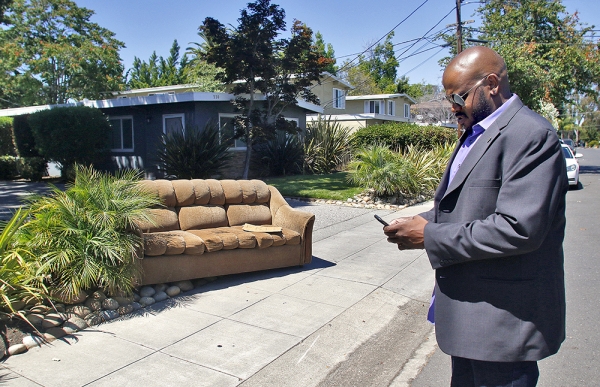
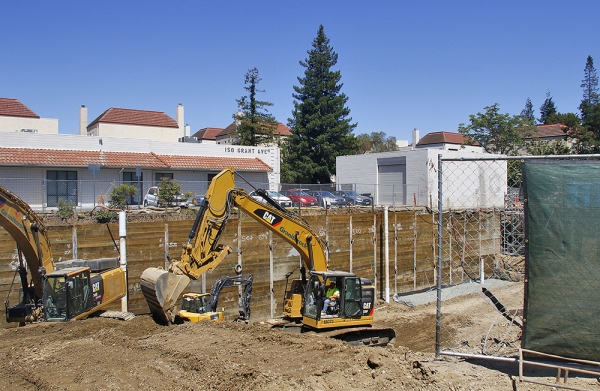
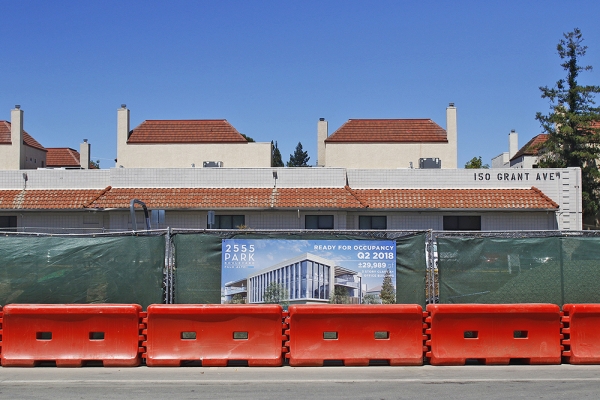
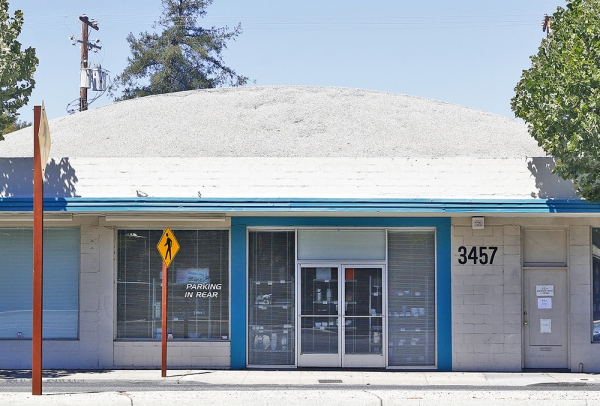
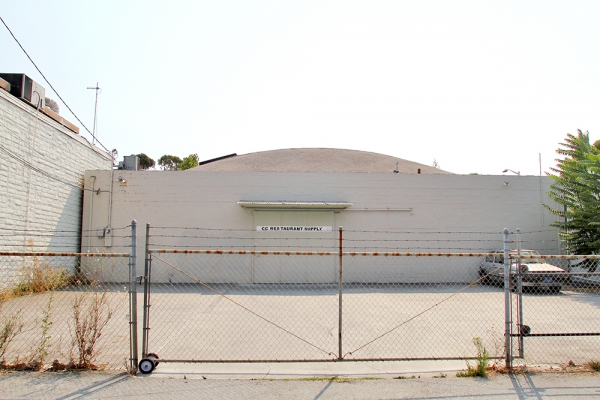
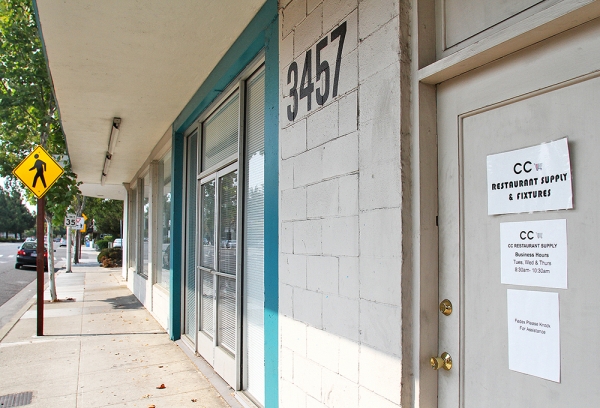
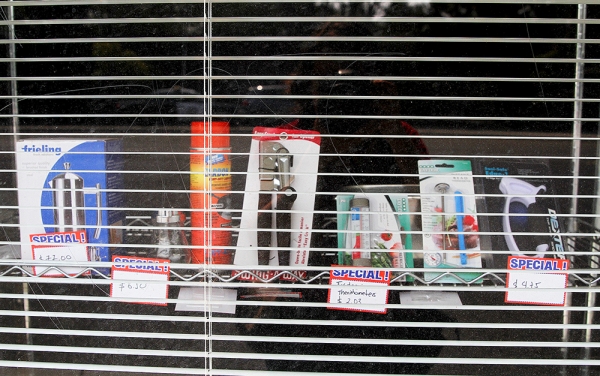
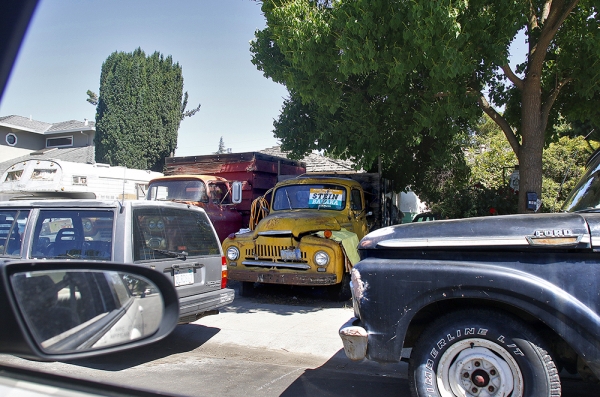
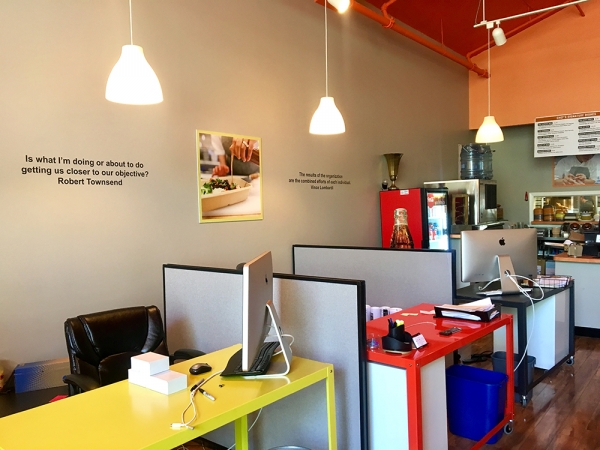
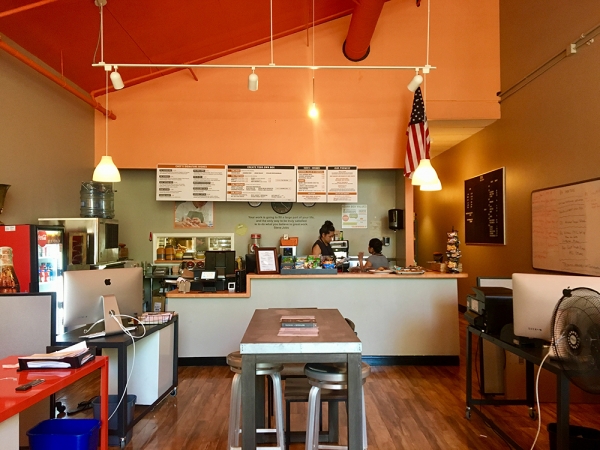

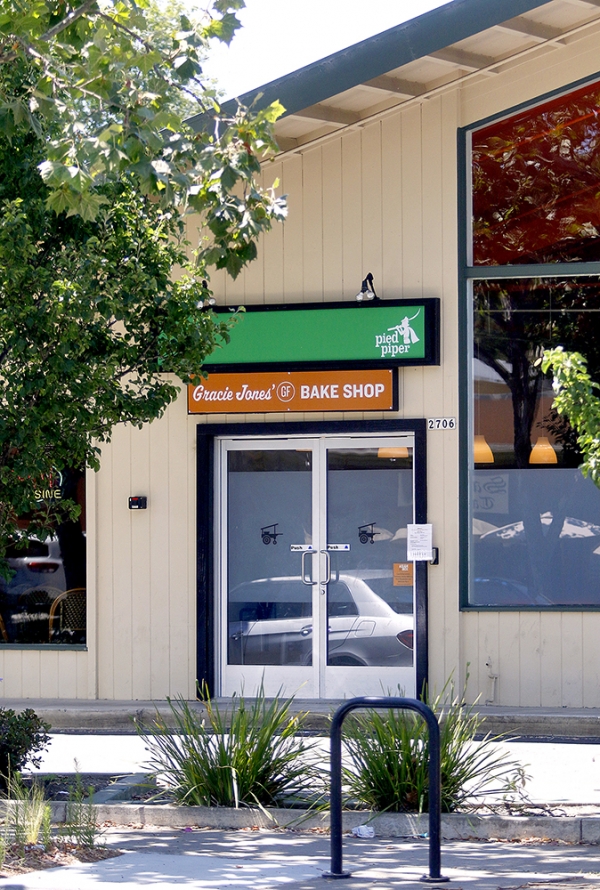
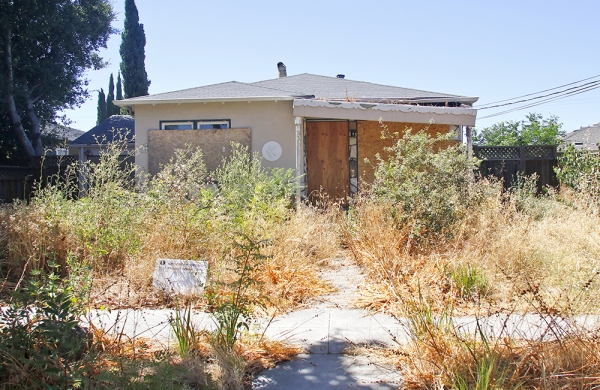
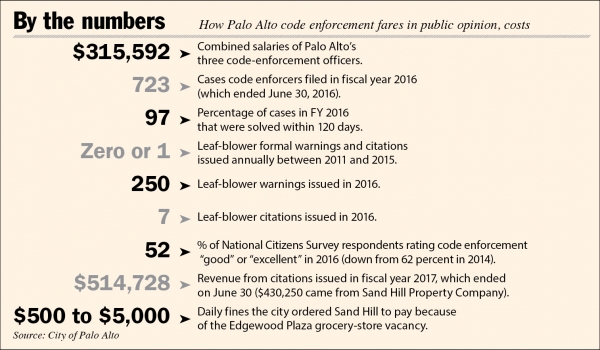


Comments
Crescent Park
on Jul 14, 2017 at 12:12 am
on Jul 14, 2017 at 12:12 am
In a nutshell, Palo Alto city officials are very skilled at making excuses but woefully slow at true enforcement -- which is what they're actually paid and sworn to do. Taking nearly two years to shut down a fake store is outrageous.
I hope the Weekly digs much, much deeper into this. And congratulations to Dellenbach for her persistence.
Mountain View
on Jul 14, 2017 at 7:02 am
on Jul 14, 2017 at 7:02 am
[Post removed.]
Evergreen Park
on Jul 14, 2017 at 8:06 am
on Jul 14, 2017 at 8:06 am
Thanks to the weekly and Council member Holman and Citizen Dellenbach for trying to shine some light on this very serious issue!
For years and years many of us (residents) having been making code enforcement complaints that have simply been ignored by city officials and the police.
They range from illegal work times on construction sites to illegal signs and illegal lights on the roof of 2100 El Camino Real that shine into neighbors homes and yards and illegal use of city streets by oversized vehicles and smokers near our front doors to illegal uses in residential and commercial buildings....the list goes on and on.
There simply needs to be a change at city hall, from the top down we need employees that are committed to following the rules and supporting the rights of residents.
Think about the recent "sale" for a mere pittance of a fee to Palantir of part of Lubberly for 14 days that meant children and adults alike were booted out of a public facility so a private company could have a lavish two week party!
So can we expect some change?
Is staff going to close down the illegal use at 3401 El Camino real, Innospring
( Web Link ) that was mentioned in the article??? the former occupant of the space was a legal personal service a physical therapist.
Next time I call the police because some one is working outside of the legal construction hours will they be fined?
Are there any city approved outdoor smoking locations in business districts as the smoking ordinance stipulates?
I appreciate that the crew of enforcement officers is small and that they have taken action to require compliance in some cases but the problem is huge and needs to be taken seriously by all city employees starting from the top by the city manager down to every police officer
Downtown North
on Jul 14, 2017 at 9:14 am
on Jul 14, 2017 at 9:14 am
This article just scratches the surface. The office on Middlefield is a disgrace. The Coupa Warehouse should have been shut down a year and half ago when first reported. IF finding had started when the issue was reported, the city could have collected over $500,000 in penalties and sent a strong message that we stand behind our ordinances. Instead the business community knows they can reap huge financial benefits without much worry - the risk-reward ratio completely makes it clear that a rational business person would violate the code and take their chances on being caught at some time in the future. Pay the fines and continue on.
I hope everyone will start reporting violations and support our code enforcement team. We have illegal offices and hotels taking away valuable housing - home used as hotels and office right in the middle of neighbohoods. This is clearly not allowed. Retail is protected all over town and should be vigilantly reported. And mass crowding in office buildings should be reported as well.
Another Palo Alto neighborhood
on Jul 14, 2017 at 9:25 am
on Jul 14, 2017 at 9:25 am
Thank you for this great investigative reporting, Gennady and Weekly. You do a great service to Palo Alto.
I and my friends have been aware of code enforcement for a long time because it's critical to everyone's quality of life. Residents need to file complaints as the eyes and ears in the community to help code enforcement who rely on us. Then we need better enforcement that doesn't allow the sort of illegal takeover of retail spaces and homes through film flam schemes like Asian Box, Coupa Cafe and many others are trying to pull the wool over everyones eyes. I bet Code Enforcement lost some more points in the next citizens survey on its handling of Coupa Cafe.
These corporations and businesses will take advantage at every turn if Code Enforcement actually sees every complaint as a court case to lose rather than an action to take when supported by reasonable evidence and common sense. It doesn't have to be the judge and jury of complaints. It's job is to investigate and enforce, based on its investigation. It's stated way of operating (judge and jury - preponderance of the evidence) goes a long way to explain why code enforcement isn't preforming well and is seen that way by residents.
It does come through sometimes though. The leaf blower thing is good. I know it was persistent at a building that was being misused, and I got an illegal sign removed once.
After reading and talking to people, I suggest City Council should pass ordinances that support better residents and code enforcement. One is needed to ban the covering of ground floor retail windows. Asian Box and CC Restaurant Supply obscure windows to a great extent. There can be some commonsense exceptions for privacy for legitimate businesses, but there is also hiding of illegal uses going on. Most legal retail businesses want customers to see into their places - bakeries or kitchen wares. It would also help to required retail hours of operation beyond "reasonable". And to also further facilitate the levying of citations and fines.
We need that other investigator asked for by Hillary Gitleman, but nixed by the city manager. Shot ourselves in the foot on that one. We will need more enforcement when people start building more granny units and more complaints are filed when they are used for airbnb, offices, etc. And if residential buildings are built under parked and tenants park where they aren't supposed to, code enforcement will have more and more work so it better improve and have the resources it needs and the laws it needs backing it. And it needs to get more aggressive quickly with zoning code violations now.
Another Palo Alto neighborhood
on Jul 14, 2017 at 10:08 am
on Jul 14, 2017 at 10:08 am
What about City workers breaking codes. The garbage trucks and the streetsweepers are regularly around before 8.00 am making noise and also before the cars have left their overnight parking spots on the street. If they arrived later they would be able to do a better job of reaching all the cans without the parked cars and a better job of sweeping the curbs rather than the middle of the street.
Crescent Park
on Jul 14, 2017 at 10:18 am
on Jul 14, 2017 at 10:18 am
Maybe if the 'understaffed' code enforcement officers were accompanied by a PAPD officer/specialist following a substantiated violation, questionable business operations and public eyesores would be eradicated far more expeditiously.
Those who have lived in PA since the 1970s will recall the slew of shady massage parlors that used to exist in South Palo Alto along the ECR and in College Terrace. The code enforcement officers and PAPD got rid of them in a reasonable timeframe. Perhaps the initial 'investigations' were far more interesting and enjoyable.
Registered user
Fairmeadow
on Jul 14, 2017 at 10:30 am
Registered user
on Jul 14, 2017 at 10:30 am
I am so glad that the City is looking into this. We are being overrun with businesses and developers. Palo Alto is a residential community above all, and needs to provide services accordingly. Thank you to the Weekly and to the City for looking into this.
Midtown
on Jul 14, 2017 at 11:08 am
on Jul 14, 2017 at 11:08 am
Corruption of such magnitude and long standing starts at the top.
The previous City Manager brought in the current manager so little has changed.
Understaffed? He had MILLIONS to unnecessarily redecorate the city hall lobby and council chambers into the cold unpleasantness we have now. And all those pseudo-resident-friendly amenities.
The culture of letting developers and businesses get away with breaking the law starts at the top.
Crescent Park
on Jul 14, 2017 at 11:26 am
on Jul 14, 2017 at 11:26 am
The City Code Enforcement has got to be a stealth Republican recruitment
conspiracy. One, or maybe two run-ins if you are really civic minded, is all
it should take to transform the happiest most altruistic Liberal into a miserable
extreme government hating Libertarian, and all for what? ;-)
Leland Manor/Garland Drive
on Jul 14, 2017 at 11:42 am
on Jul 14, 2017 at 11:42 am
Minor correction: Amy French is the Chief Planning Official, not the Chief Building Official. Those jobs are VERY different.
Another Palo Alto neighborhood
on Jul 14, 2017 at 11:55 am
on Jul 14, 2017 at 11:55 am
I made an appointment over the phone to come in and they were very accommodating.
Registered user
editor of the Palo Alto Weekly
on Jul 14, 2017 at 11:55 am
Registered user
on Jul 14, 2017 at 11:55 am
You're right, of course, Judith. Thank you for pointing that out; it's been corrected. Our apologies to Ms. French.
Ventura
on Jul 14, 2017 at 11:58 am
on Jul 14, 2017 at 11:58 am
As a resident of Ventura, I applaud the Weekly for shining a light on this issue and the efforts of a dedicated few to try to uphold the rights of the many. CC Restaurant Supply is, indeed, a "charade" and a "farce" and its retails hours are "lipstick on a pig." If Coupa Cafe opened a real location here with their full service and menu, foot traffic would increase. Without effective enforcement, the code is meaningless. It's not enough to have a flimsy excuse or to be violating the clear spirit of the law but not every letter. Code enforcement must be more aggressive, and City leaders need to give them whatever tools they are lacking to do so.
Ventura
on Jul 14, 2017 at 12:04 pm
on Jul 14, 2017 at 12:04 pm
"The last thing Stephens wants, he said, is for the city to end up on the losing end of a court battle stemming from a lawsuit filed by an aggrieved violator."
Why? Losing a lawsuit is not the "last thing" I'd want. Degradation of our quality of life and residential communities due to fear of litigation is a much worse outcome in my mind. Palo Alto is way too litigation-averse.
I also do not understand why "the city attorney's office had determined that the existing business is grandfathered in under prior rules." Either that determination is incorrect, or the City Council needs to pass new rules that either rectify this defect or provide for a sunset/transition period so that the new rules apply to everyone.
Midtown
on Jul 14, 2017 at 12:34 pm
on Jul 14, 2017 at 12:34 pm
I thought for leafblower violations, one had to call the police. This article seems to say that code enforcement should be contacted instead. Which is it?
Crescent Park
on Jul 14, 2017 at 12:59 pm
on Jul 14, 2017 at 12:59 pm
>I thought for leafblower violations, one had to call the police. This article seems to say that code enforcement should be contacted instead. Which is it?
I'd like to see all leaf blowers banned as they only serve to kick-up allergens, dust and merely transfer the debris to someone else's front yard. In addition, they are noisy and pollutant.
Whatever happened to the old days in PA when gardeners used rakes and grass catchers? If the gardeners union/associations were to complain about cost-effectiveness, I imagine some PA residents would be willing to pay more for their gardening services if it were done 'manually'.
Rather than a gardening noise abatement policy, there should be designated 'no noise' neghborhoods in PA.
Palo Verde
on Jul 14, 2017 at 1:05 pm
on Jul 14, 2017 at 1:05 pm
^ In the old days we mowed our own lawns. Or hired the kid next door.
Crescent Park
on Jul 14, 2017 at 2:09 pm
on Jul 14, 2017 at 2:09 pm
> In the old days we mowed our own lawns. Or hired the kid next door.
Yep. It was part of one's allowance structure. When was the last time you saw a kid cutting the lawn in PA? It's no longer part of their 'family' job description.
Duveneck/St. Francis
on Jul 14, 2017 at 2:15 pm
on Jul 14, 2017 at 2:15 pm
Thank you, Palo Alto Weekly for this breathtaking article that concerns matters that are absolutely important to our community. This city has plenty of money to concentrate on these egregious code enforcement issues, which do impact our quality of life. I urge PA City officials to prioritize code enfircement; this is a crystal-clear function of City government. No excuses and no delaying.
Registered user
Evergreen Park
on Jul 14, 2017 at 3:24 pm
Registered user
on Jul 14, 2017 at 3:24 pm
Why was CC given the permit in the first place? Did their application meet the criteria for retail space? If so, the codes need to be updated so that code enforcement is not second guessed by the city attorney in favor of commercial uses. And if not, then who is responsible for signing off on the permi?
That our city manager has refused to increase code enforcement staffing even by one person speaks volumes about who he sees as his primary constituents. Watching council meetings it doesn't tend to appear to be the residents.
Although the PC zoning is not currently being used, most of the new developments that the council now approves will require code enforcement because approval comes with the condition that a large proportion of the occupants will not drive. Goals that are either magical thinking or cynical because compliance will be impossible to prove or for our code employees to enforce.
another community
on Jul 14, 2017 at 4:25 pm
on Jul 14, 2017 at 4:25 pm
I've placed orders online and picked them up at my convenience without a problem.
Another Palo Alto neighborhood
on Jul 14, 2017 at 4:49 pm
on Jul 14, 2017 at 4:49 pm
Everyone should email your comments and experience with code enforcement to the City Auditor, Harriet Richardson who is doing the audit and survey mentioned here. That way you can hopefully help improve it. Here is her email address: harriet.richardson@cityofpaloalto.org
The city forces code enforcement complainants to use its miserable 311 online site to file complaints. It is unfriendly and doesn't give basic information as to why and how the complaint is progressing or was resolved with enough detail to understand what happened and why, and doesn't allow follow up communication. As is said - the medium is the message, and here the message is - resident, don't bother us with your complaint. Get rid of the 311 straight jacket. We deserve better.
Midtown
on Jul 14, 2017 at 5:34 pm
on Jul 14, 2017 at 5:34 pm
Thanks PA Online! Great article.
In regards to the reference above to the resident who (thankfully) filed a complaint in May 2017 for code violations against the Asian Box corporate office (aka Gracie Jones Bake Shop): I personally called Code Enforcement in September 2016 to express my concerns about a corporate office taking over a neighborhood restaurant space. City of PA Code Enforcement James Stephens summarily dismissed my complaint and indicated Asian Box headquarters met code requirements. Clearly it did not meet code as evidenced by the code violation mentioned in the above article. How interesting that it took 8 months for PA Code Enforcement to even look into the matter after I initially contacted them.
It's unfortunate that the Asian Box CEO says "all he has to sell is Coke and Sprite" to be legal (as stated in the article above). Clearly this is not what the neighborhood wants or needs, and why there are codes against "general business office use" in Midtown. This appears to be a very 'in your face' aggressive stance with both the city and neighbors. And saying this Asian Box corporate headquarters space is now a "community-type center where seniors are using our computers and printers and also ordering baked goods" is ludicrous when we have the Mitchell Park Library with resources for these purposes just a few blocks away in Midtown (both banks of computers and Ada's Cafe). It's all just a smokescreen for a corporate office that shouldn't be in the Midtown Plaza. Most disappointing is that the City of PA allows this when it clearly does not meet the spirit of the code and does not serve the neighborhood the way retail space does. The City of PA just opened the door for any corporate office that sells a few sodas as a "front" to take over retail space in Midtown.
Professorville
on Jul 14, 2017 at 5:56 pm
on Jul 14, 2017 at 5:56 pm
A well-done article. One comment. The article asks the question, just what is it that citizens of Palo Alto are unhappy about when it comes to lack of code enforcement, this or that or something else? Clearly, it is all of those things mentioned in the article. It seems clear that codes are not well constructed and difficult to enforce; business and developers are only to happy to circumvent the intent of the codes for their own purposes. I wish there were a code to disallow a neighborhood residence to be in a state of rehabilitation for (so far) thirteen years. I also wish that code enforcers would insist on strict adherence to requirements. At the time, we went through some inconvenience when the electrical inspector would not sign off on a permit as she held the contractor's feet to the fire. Still, I am glad she did the right thing. For a long time, the camel's nose under the tent of intrusive parking in neighborhoods with little help from the City is being felt all over the city as the camel works its way further and further into the fabric of the city. As issues arise in other areas, I hope that residents continue to point them out and continue to rate the City on a scale somewhere less than good until concerted effort (effort in CONCERT, not in silos) is made to improve the ratings and that must be done by the City. Residents will respond appropriately.
Another Palo Alto neighborhood
on Jul 14, 2017 at 6:06 pm
on Jul 14, 2017 at 6:06 pm
If you talk to the City Manager or the Mayor about code enforcement, they will tell you they depend largely on voluntary compliance for code enforcement.
The problem with voluntary compliance is, it is not really voluntary. What the City Manager and the Mayor call voluntary compliance actually depends on social pressure to achieve compliance. Voluntary compliance depends on people needing to be, or at least wanting to be, good neighbors.
Today, many of Palo Alto's residential and commercial properties are owned, managed, and maintained, by non-resident landlords and employees who can be ambivalent or even contemptuous of Palo Alto's residents and culture.
Weekdays Palo Alto's resident population is outnumbered by non-residents 2-to-1. Non-residents just do not feel the same social pressure to comply with local codes as residents.
Bottom line, the quaint days of voluntary compliance are over and the loss is yet another example of the collateral damage visited on residents by over-development. Development isn't just overwhelming Palo Alto's infrastructure, it is overwhelming and destroying Palo Alto's culture.
Registered user
Ventura
on Jul 14, 2017 at 6:23 pm
Registered user
on Jul 14, 2017 at 6:23 pm
This is in my neighborhood and I get the "it's a matter of 'spirit of the law' versus 'letter of the law.'" I'm just amused that Palo Alto puts this much effort into going after CCRS while at the same time turning a blind eye to an illegal car repair business that has been running out of a residence less than a quarter mile away for many (well over 10) years.
Mayfield
on Jul 15, 2017 at 2:06 pm
on Jul 15, 2017 at 2:06 pm
We live near 2555 Park BLVD development and the generator vibrated our house for a week leaving us sleepless with young children. It took the city that long to get them to shut it off. It was a nightmare. When we talked to the police so many times they were like "we can right a ticket but they're developers" As if, they run the town. Developers are the new gangsters.I'm just saying.
Leland Manor/Garland Drive
on Jul 15, 2017 at 3:19 pm
on Jul 15, 2017 at 3:19 pm
Four blocks down on El Camino (3877 ECR) sits an abandoned Compadres. It's been closed since 2008. How can something like that be beneficial to the neighborhood?
Registered user
Midtown
on Jul 15, 2017 at 4:52 pm
Registered user
on Jul 15, 2017 at 4:52 pm
Not mentioned in this article is the many fences that do not comply with the Palo Alto code, which requires that fences within 5 feet of the sidewalk be four feet high, and near intersections no more than 3 feet, and if more than 5 feet from the sidewalk, can be as much as 6 feet. See below for the detailed fence ordinance. Some fences built prior to when the code was enacted are grandfathered. A quick search did not show when it was enacted. The fence code is documented below was reprinted in 2002 so it was in effect by then at the latest.
There are lots of six foot fences next to the sidewalk or within 18 inches built within the last 15 years. I'm sure some have legitimate variances, but I have not been able to ever get an answer as to whether a particular nonconforming fence has a variance or is grandfathered in. Others that I have reported are clearly new, based on the lack of weathering.
Web Link
I first complained about a nearby fence in Dec. 2013. In February 2014, it was finally lowered after many emails to code enforcement and the city council. At that point, I complained about 3 other nearby fences. Those did not get lowered until March 2016, after much follow up and copying of emails to the city council. There is still one up near a corner, which had been used to hide two sheds that were totally out of compliance, and quite dangerous with electricity supplied with an extension cord. The sheds have been removed, but the debris remains, ready to be rebuilt behind the fence that hid the sheds. Fences hiding nonconforming uses behind the fence, are one of the reasons for forbidding them.
Please note: I am not against ADU's. I would have supported an ADU on that property if it met Palo Alto codes. I would have been ok with minor variances. I cannot support sheds that are a fire hazard.
Although code enforcement did eventually get 3 fences reduced, I complained about several others. What I haven't ever been able to find out is if these fences are legitimate, either because they are grandfathered or they were given variances. I do believe I deserve an explanation if these nonconforming uses are in fact legitimate. For the moment, I've given up complaining as it is very time consuming. I urge others to register complaints on Palo Alto 311 which while clumsy, does establish a record that encourages resolution.
Registered user
Midtown
on Jul 15, 2017 at 4:53 pm
Registered user
on Jul 15, 2017 at 4:53 pm
oops - should be Not mentioned .... are the many fences
Another Palo Alto neighborhood
on Jul 15, 2017 at 5:02 pm
on Jul 15, 2017 at 5:02 pm
Thank you James Stephens! It's noticeably better since you got here.
Midtown
on Jul 15, 2017 at 5:26 pm
on Jul 15, 2017 at 5:26 pm
"Gitelman made a pitch to add another code-enforcement position. That proposal, however, was vetoed by City Manager James Keene during the budget process."
The culture of corruption is ingrained in the staff and the City Manager shamelessly reinforces it.
If you expect the Auditor to point out the corruption of the Manager, (their offices are next to one another in City Hall) you are dreaming. Her job is 50% PR for the City and 25% covering up for the self serving staff.
Recall how she reported the last Citizens Survey? You would have thought it was a glowing report. Far from it.
Mountain View
on Jul 15, 2017 at 8:29 pm
on Jul 15, 2017 at 8:29 pm
I went there by appointment and got all the rentals I needed for my daughter's graduation party at a great price. I also got some used items for my house. Not sure why so much fuss over a company that does business and serves the public, even if it is by appointment or in the morning hours.
Midtown
on Jul 15, 2017 at 11:45 pm
on Jul 15, 2017 at 11:45 pm
I hope all who are so indignant about businesses violating code are ready to have the same scrutiny applied to their homes. Are you gardeners using gas powered blowers, are the sidewalks in front of your house clear of trees & shrubbery intruding, do you park your cars with wheels on the sidewalk, do you put out & retrieve your greenwaste bins at proper times?
Old Palo Alto
on Jul 16, 2017 at 2:04 am
on Jul 16, 2017 at 2:04 am
Castilleja School has been out of compliance for 17 years.
Mountain View
on Jul 17, 2017 at 9:25 am
on Jul 17, 2017 at 9:25 am
[Post removed.]
Community Center
on Jul 28, 2017 at 1:39 pm
on Jul 28, 2017 at 1:39 pm
In summary, the head of code enforcement needs to be fired for not meaningfully enforcing the code and creating an office that perpetuates code violations. It seems the only way to get codes enforced is to get a city council member involved.